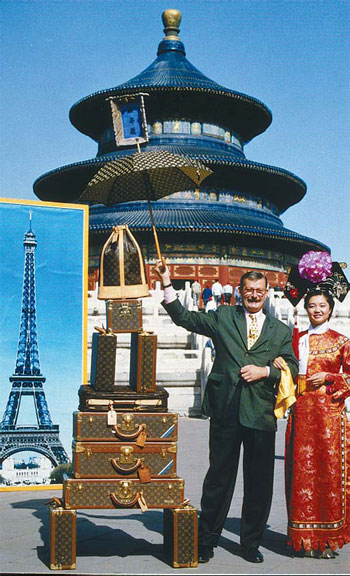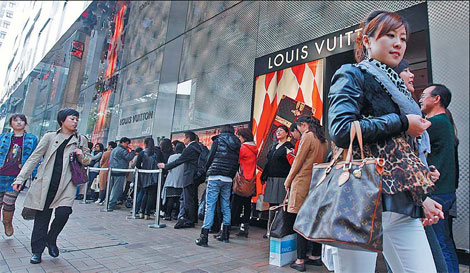In love with LV
Updated: 2012-06-05 07:48
By Tiffany Tan (China Daily)
|
|||||||||||
|
Customers, most of whom are from the mainland, line up outside an LV store in Hong Kong. Zou You / For China Daily |

As China prepares to replace Japan in the top spot for worldwide luxury consumption, Louis Vuitton is well placed to capitalize further on its brand. Tiffany Tan reports in Beijing.
 |
Fang Wenting has had an eight-year love affair with Louis Vuitton. The 30-year-old bought her first LV in 2004, the classic Speedy 30 handbag in Monogram Multicolore Canvas.
Since then, she has built quite a collection from the French luxury label: around a dozen bags, a wallet, a card holder, a pendant, a belt, a key chain, a hairclip, scarves and T-shirts.
Fang, a Shanghai housewife, is upfront about her admiration of the 158-year-old brand.
"After having bought many luxury items, I realized that, whether it be customer service or the quality of bags, LV is really a master."
Late last year, she joined an online club of Louis Vuitton aficionados. The Chinese group, which has 13,000 followers, is comprised largely of urban women in their 30s who discuss their latest purchases, compare product prices in various countries and share photos of discontinued models found in secondhand stores, founder Liu Xiao says.
Among the club's active members is 29-year-old Chen Xiaolei, a marketing manager in the Internet industry. The Shanghai resident discovered LV six years ago and now owns two of its handbags, a belt and a wallet.
This year, however, Chen is dreaming of getting her hands on Chanel's signature 2.55 quilted shoulder bag.
"If I go to cocktail parties or attend weddings and other elegant events, I think a Chanel would be prettier and more suitable," she says.
As Louis Vuitton marks two decades in China this year, the fashion house is confronted with a byproduct of its tremendous success: It is trying to maintain the image of exclusivity in a market that it dominates - and where it's expected to grow even bigger.
When LV opened its first of 39 mainland stores at Beijing's Peninsula Hotel in September 1992, luxury goods were practically nonexistent in China. Now, the country is the world's second largest consumer of luxury products. Last year, it accounted for $12.6 billion, or 28 percent, of luxury purchases globally, according to survey results released in May by the advertising company Publicis.
By 2015, as the number of affluent mainlanders continues to grow, China is expected to bump off Japan from the top spot in luxury consumption.
"Yves Carcelle, as the chairman of Louis Vuitton for the last 21 years always thought from the very beginning, along with a few of us, that China would eventually - in those days we used to say eventually - become either the most important or a very, very important destination for Louis Vuitton in the world," Christopher Zanardi-Landi, president of Louis Vuitton in China, says in an exclusive interview in Beijing.
The executives' foresight has paid off.
 |
|
Patrick Louis Vuitton, the great-great-grandson of LV's founder, promotes the brand in the Temple of Heaven in Beijing in 2002. |
The Chinese are now the biggest customers of the multibillion-dollar company, which started out as a trunk maker serving 19th century European aristocracy. Louis Vuitton has also become - and remains - the "most desired luxury brand" on the Chinese mainland, according to a 2011 study by management consulting firm Bain & Company.
"LV enjoyed first-mover advantage for many years," says Angelia Teo, content director for Asia Pacific at WGSN, a forecasting service for fashion trends. "Its logo practically means luxury for some customers."
The flipside of this popularity is that some customers think the brand is losing its sheen of exclusivity, and they are moving to labels that are less commonly seen.
"The truly wealthy no longer want to buy the same fashion brands everyone else has," says a CNBC report by Shaun Rein, founder and managing director of China Market Research Group, "causing challenges for Louis Vuitton and other historically dominant players like Zegna and Omega. (Mega rich Chinese) are moving more toward inconspicuous consumption in handbags and apparel".
How is the French luxury label dealing with this trend, even as it attracts more clientele from second- and third-tier cities?
"We do try very hard to do everything without any sense of compromise. And I think Chinese customers really appreciate that, and they see it. That I would say is very much the key to it," says Zanardi-Landi, a Briton who has been with Louis Vuitton in China since 2003, and who is married to a native of Sichuan and is the father of an 8-year-old boy.
"The products we create are completely unique in the way we do them. There's a really, really strong investment that we put in after-sales. I mean, the after-sales structure that we built in China is unparalleled to anybody else's."
Next month, as part of the label's 20th anniversary celebration in China, LV will unveil an expanded store at Plaza 66, Shanghai's premier luxury shopping mall.
Zanardi-Landi declined to reveal details of the store ahead of its reopening, except to say: "It's really one of the most extraordinary stores we've built anywhere in the world. We think it will bring a level of elegance, sophistication and refinement that is new, frankly, to the world of luxury."
The label's focus in China right now is the quality of its customer service rather than the quantity of its stores. This is partly to encourage Chinese customers to do their shopping at home - even if prices here are higher.
"There are reasonably high import duties and very high VAT in China, which of course has an impact on the price," Zanardi-Landi says. "We would love to be able to have pricing in China that's the same as other markets in the world, but unfortunately we're unable to do that today.
"In each city that we have a Louis Vuitton store, what we try to do is to have a very close relationship with our customers," he adds. "It's clear that if you're at home and you walk into the store where everybody knows you and greets you by name that's a very personal experience and can't be matched anywhere else."
Strategies like this are among the ways the French fashion house is staying ahead of competition.
"I don't think LV ever stands still - especially in China," says Teo, who is based in Hong Kong.
"The new (Plaza 66) store is also reported to have craftsmen in-store explaining their handwork. This will mark a shift in marketing strategy from the brand, in response to the consumers' changing needs."
When the store opens its doors on July 18, there's a good chance Fang Wenting will be among its first shoppers.
"LV was the first luxury brand I ever encountered, so it's also the brand that has made the strongest impression," she says.
Contact the writer at tiffany@chinadaily.com.cn
Today's Top News
Rescuers race against time for quake victims
Telecom workers restore links
Coal mine blast kills 18 in Jilin
Intl scholarship puts China on the map
More bird flu patients discharged
Gold loses sheen, but still a safe bet
US 'turns blind eye to human rights'
Telecom workers restore links
Hot Topics
Lunar probe , China growth forecasts, Emission rules get tougher, China seen through 'colored lens', International board,
Editor's Picks

|

|

|

|

|

|






